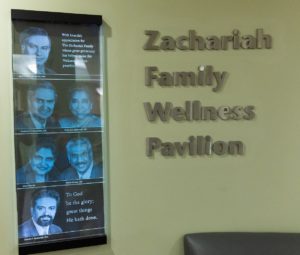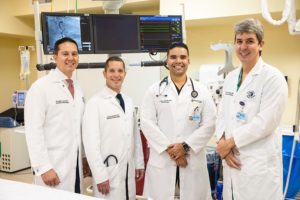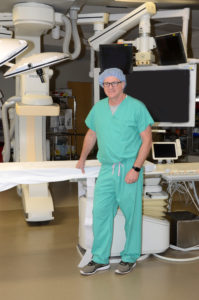Heart disease is the leading cause of death in the United States, claiming the lives of more than 650,000 people each year. Since February is American Heart Month, we’re featuring one man’s journey to heart health at Holy Cross, Broward’s only Catholic hospital, serving our community for 67 years and a leader in the prevention and treatment of cardiac and vascular diseases.
When Doug Wilkins, a 70+ year-old longtime active athlete in overall good health, began having chest pains, he took himself to the emergency department at Holy Cross Health in Fort Lauderdale, where they ran a stress test. The test revealed that he had major blockages in three arteries and ended up having triple bypass surgery in September 2019. He participated in cardiac rehab at Holy Cross and in less than four months, graduated from that program. “I noticed a difference immediately after surgery,” he said. “I was feeling a lot better and that feeling continued as I participated in cardiac rehab. I didn’t realize how bad I was feeling until my heart was fixed.”
 Today, Doug is active, enjoying life while choosing to make lifestyle modifications. He quit smoking and is watching his sodium intake. He and his wife also work out at the Zachariah Family Wellness Pavilion at Holy Cross.
Today, Doug is active, enjoying life while choosing to make lifestyle modifications. He quit smoking and is watching his sodium intake. He and his wife also work out at the Zachariah Family Wellness Pavilion at Holy Cross.
“Our team of 24/7 on-call Interventional cardiologists stands ready to perform emergency cardiac procedures,” said Holy Cross Health interventional cardiologist Joshua M. Purow, MD. “Our outstanding cardiovascular team, utilizing state-of-the-art technology, can treat any heart and vascular condition, especially in an emergency.”
Doug’s success story is one of many to be celebrated in February for National Heart Month. The Jim Moran Heart and Vascular Center at Holy Cross Health specializes in the education, prevention, detection, and treatment of cardiac and vascular diseases and has a long, illustrious history of treating heart patients with the highest quality care.
Why does that matter? When it comes to affairs of the heart, time is of the essence. Cardiovascular diseases are the number one cause of death in the U.S. On average, one American dies every 39 seconds of cardiovascular disease. “Early detection of heart disorders saves lives,” said Holy Cross Chief of Cardiac Surgery, Alexander Justicz, MD. “Don’t ignore the signs. You know your body better than anyone. If you think there is something wrong, see your physician.”
Award-winning heart & vascular care
Most recently, U.S. News & World Report, the global authority in hospital rankings and consumer advice, named Holy Cross Health as a 2022-2023 High Performing hospital for eight conditions, including Heart Attack and Heart Failure, in recognition of care that was significantly better than the national average, as measured by factors such as patient outcomes. This is the highest award a hospital can earn for these ratings, which are designed to assist patients and doctors in making informed decisions about where to receive care for challenging health conditions or elective procedures.
The extensive quality of care patients receive at Holy Cross is reflected by the certification the non-profit hospital’s cardiopulmonary rehabilitation program received by the American Association of Cardiovascular and Pulmonary Rehabilitation (AACVPR), the only peer-review accreditation process designed to review individual programs for adherence to standards and guidelines. AACVPR-certified programs are recognized as leaders in the field of cardiovascular and pulmonary rehabilitation because they offer the most advanced practices available.

Holy Cross Health also has received the American Heart Association’s Get with The Guidelines-Heart Failure GOLD PLUS with Honor Roll and Target: Type 2 Diabetes Honor Roll Achievement Award for the hospital’s commitment to managing heart failure in patients. “This award recognizes the hospital’s commitment to ensuring heart failure patients receive the most appropriate treatment according to nationally recognized, research-based guidelines founded in the latest scientific evidence,” said Holy Cross cardiologist Mikhailia Lake, MD. “The goal is speeding recovery and reducing hospital readmissions for heart failure patients.”
Early detection of life-threatening heart disorders is possible through the use of Echocardiography procedures. Holy Cross is accredited in Echocardiography in the areas of Adult Transthoracic by the Intersocietal Accreditation Commission, which is only granted to facilities that provide quality patient care, in compliance with national standards through a comprehensive application process including detailed case study review. The accreditation is a “seal of approval” that patients can rely on as an indication that the facility has been carefully critiqued on all aspects of its operations considered relevant by medical experts in the field of Echocardiography.
“The recognitions and certifications we receive are a testament to the incredibly knowledgeable, caring and compassionate healthcare staff at Holy Cross,” said structural heart disease specialist Alexander Llanos, MD. “They are a transforming healing presence, improving the health of those in our community each and every day.”
Clinical cardiac research
Holy Cross Health is also a leader in clinical cardiac research. “Through participation in trial studies, we continue to expand our efforts in offering innovative research studies to ensure the best possible long-term outcomes for patients in our community,” said Joshua M. Larned, MD, who is leading several heart failure studies including:
- evaluating the effect of in-hospital initiation of Dapagliflozin on clinical outcomes in patients who have been stabilized during hospitalization for Acute HF;
- collecting sensor and heart failure event data that will be used to develop and test new diagnostic features for the insertable cardiac monitor ICM systems;
- evaluating the effect of sacubitril/valsartan (LCZ696) vs. valsartan on changes in NT-proBNP and outcomes, safety, and tolerability in HFpEF patients with ADHF who have been stabilized during hospitalization and initiated in-hospital or within 30 days post-discharge;
- evaluating the efficacy and safety of AZD4831 in participants with heart failure with left ventricular ejection fraction;
- studying the safety and effectiveness of cardiac contractility modulation therapy in subjects with symptomatic heart failure; and
- evaluating the efficacy and safety of the sGC Stimulator Vericiguat/MK-1242 in adults with stable heart failure with reduced ejection fraction.

“Holy Cross Health has always been on the cutting-edge of technology and providing excellent care,” said cardiologist Karan Munuswamy, MD. “I am very fortunate to be working with other highly qualified physicians and participating in research studies that will lead to positive outcomes for patients.”
Additional current studies are: Acute ACS, led by Dr. Purow, to investigate the efficacy and safety of CSL112 in subjects with Acute Coronary Syndrome; Recent ACS, led by Dr. Munuswamy, investigating post-discharge care pathway for patients with a recent acute coronary syndrome who have elevated LDL-C despite being on maximally tolerated statin therapy following an ACS will be randomized to receive one of our new LDL-C lowering therapies or usual care; and Hypertrophic Obstructive Cardiomyopathy, led by Elias Collado, MD, evaluating the efficacy and safety of IP in adults with symptomatic Hypertrophic Cardiomyopathy and Left Ventricular Outflow Tract Obstruction.
“The importance of studies, trials and research cannot be understated,” at Holy Cross, said Dr. Collado, an advanced heart failure specialist at Holy Cross Health. “We are continually providing increased access to studies and trials for our patients.”
Transcatheter Aortic Valve Replacement (TAVR)

The first TAVR procedure at Holy Cross Health was done on March 16, 2012, and the 100th on August 12, 2015. For patients who are considered high-risk and for those who cannot undergo open heart surgery, TAVR is a first-of-its-kind artificial heart valve approved by the Food and Drug Administration that can now be threaded into place via four different approaches, ensuring that every patient has an anatomical pathway to replace the aortic valve. According to the Food & Drug Administration, about 300,000 patients in the U.S. experience valve deterioration, meaning the heart must work harder to pump blood, often leading to heart failure, blood clots and death.
Other first procedures
In 2009, the first patient at Holy Cross received the first Impella implant, the mechanical cardiovascular support system that can sustain a patient’s heart for up to seven days.
In 1983, the first angioplasty procedure to restore blood flow through narrow or blocked arteries was performed at Holy Cross Health.
Global, national, statewide and local firsts
For 67 years, Holy Cross Health has been at the forefront of healthcare in South Florida. The mission-driven, innovative, faith-based health organization has tallied many firsts in cardiac care in Broward County, the state, the nation and globally.
Holy Cross was the first in Broward County to achieve The Joint Commission’s Advanced Certification in Heart Failure, for maintaining the highest standards in providing stroke or heart failure care; perform Transcatheter Aortic Valve Replacements on high-risk patients and on patients who cannot undergo or are at high risk open heart surgery; offer Induced Hypothermia, which has shown to increase the odds of surviving cardiac arrest and has also shown to improve neurological outcomes after such an event; implant Reveal LINQTM, the smallest wireless, long-term, cardiac monitor available on the market; and be a Joint Commission Advanced Heart Failure Certified program.
In South Florida, Holy Cross was the first to offer the Medtronics MyCareLinkTM Patient Monitor, a simplified remote monitoring system with global cellular technology that transmits patients’ cardiac device diagnostic data to their clinicians; with two daVinci S surgical systems for minimally invasive surgeries; participate in the AngelMed ALERTS Study of an implantable cardiac monitor and patient alerting system; and begin work on South Florida’s first Rotational 60 Cobalt Unit for radiation therapy as implants and as an external source of radiation exposure.
In Florida, Holy Cross Health was the first to utilize the iCT 256-slice scanner to offer Cardiac CT Angiography (CCTA), state-of-the-art technology that’s faster, safer, offers clearer images and allows physicians the ability to detect life-threatening illnesses at an early stage, including heart disease; to perform a Paravalvular Leak Closure using a transapical approach, for patients who are not suitable candidates for open heart surgery due to age or medical conditions; to use the Prime ECG Vest which, in select patients, may give physicians additional data beyond a traditional electrocardiogram; with the 256-slice CT scanner, the first in South Florida to use the scanner in the treatment of wake-up strokes and to perform Cardiac CTA.
“I could not be prouder of the heart and vascular care we provide at Holy Cross,” said Mark Doyle, president, and CEO. “We are home to top physicians and specialists in a wide range of specialties.”
Click here for an article on mental health.

Comments